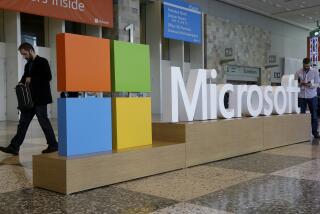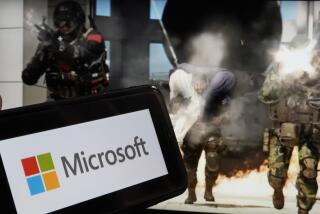Microsoft to Pay $2 Billion to Sun
- Share via
The technology industry’s fiercest feud ended Friday with Sun Microsystems Inc. settling its antitrust claims against Microsoft Corp. in a $2-billion deal that clears the way for an era of computing based more on cooperation than competition.
The surprise agreement capped 10 months of covert talks and includes a pledge to share enough trade secrets so that the two companies’ products can work together much more easily. It wipes away a decade of personal animosity that engulfed Microsoft Chairman Bill Gates and Sun Chief Executive Scott McNealy and divided much of the industry. The rivalry spawned landmark antitrust actions against Microsoft by regulators in the U.S. and Europe.
“The industry is growing up, and companies need to do a better job of cooperating,” said Microsoft General Counsel Brad Smith.
The peace treaty underscores the fading fortunes of Sun, which said Friday that it would embark on a costly makeover by slashing 3,300 jobs and take $825 million in charges over the next several quarters in an attempt to cut deep enough to return to profitability. The Santa Clara, Calif., company has lost more than $3.8 billion in the last year and a half building computer systems for businesses.
Most of Sun’s revenue comes from sales to companies in such data-intensive industries as telecommunications and financial services. As those customers have turned to cheaper alternatives, including the free operating system Linux, Sun’s sales have fallen 40%. Its stock has lost 90% of its value since peaking in late 2000.
Sun also controls the development of the computer language Java, which once threatened Microsoft’s flagship Windows operating system because it makes it possible to write a single program that can run on any platform. The antitrust case settled Friday stemmed in part from Microsoft’s effort to “pollute” Java and splinter the language to make it less versatile, as one Microsoft executive wrote in an e-mail produced in court.
The $2-billion accord represents the largest payout Microsoft has agreed to make to settle any of its legal challenges. Microsoft has $53 billion in cash and marketable securities and earns more than $2 billion in an average quarter.
The deal includes $700 million to end Sun’s suit and its role as a driver in the process that led the European Commission to rule in March that Microsoft illegally bundled programs into Windows. An additional $900 million will resolve patent issues, and $350 million will go toward Microsoft’s future use of Sun know-how.
The detente was instigated last June when McNealy -- long the most prominent Microsoft antagonist, famed for deriding Windows as a “giant hairball” -- invited Microsoft CEO Steve Ballmer to Silicon Valley for a round of a golf.
The negotiations began at McNealy’s house and continued in phone calls between the CEOs and in meetings between Gates and Sun’s technology chief, Greg Papadopoulos. The deal was sealed during marathon face-to-face sessions at law offices in New York and San Francisco, finishing at 4:15 a.m. Friday. If the end had come five hours earlier, on April Fools’ Day, Smith said, many in the technology world would not have believed it was true.
For it had been Sun, along with Oracle Corp., Netscape Communications Corp. and America Online Inc., that first complained to the Justice Department in 1995 that Microsoft was abusing its monopoly over desktop computer systems. As that case withered away in appeals and settlement efforts, Sun alone triggered the European Commission antitrust probe leading to last month’s order that Microsoft pay a $613-million fine and divulge more secrets to rivals.
At technology gatherings over the years, McNealy could be counted on to provide the strongest arguments against Microsoft’s vision of the world, often drawing laughs from those in his camp. To McNealy, Microsoft’s .Net software framework was “.Not.” The company’s system for having pieces of a network find each other automatically was not Plug and Play but “Plug and Pray.”
But the jokes, like the strategy, grew stale.
“There was pressure from the world’s largest information technology customers, plus the need for the companies to clear the decks of some of these legal and monetary issues,” said IDC analyst Jean Bozman.
For all the years of rhetoric, Sun’s instigation of antitrust enforcement proceedings and its own lawsuit against Microsoft, McNealy and Ballmer “have actually been pretty good friends for a long time,” McNealy maintained Friday at the San Francisco hotel where the settlement was announced. Both executives grew up in Michigan and were undergraduates at Harvard together as well as classmates at Stanford Business School.
Microsoft investors saw the $2-billion deal as a bargain, bidding the company’s shares up 77 cents to $25.85 in Nasdaq trading Friday. Sun investors were also optimistic about the partnership, boosting shares 21%, or 87 cents, to $5.06 in Nasdaq trading.
The two companies will immediately work together to make their software for managing computer networks compatible and plan to discuss additional sharing on a range of issues, with security and user authentication near the top of the list.
Sun software chief Jonathan Schwartz, who was promoted Friday to president and chief operating officer, said the alliance would help Sun sell its recently introduced Java Desktop System, a cheap rival to Windows for personal computers, because that program would work better with Microsoft’s gear.
Asked if he was going to change his firebrand ways, McNealy was an evolution in progress.
“I don’t predict,” he said at first.
“I’m going to do my best to be good,” he added, still struggling.
“I will be good.”






